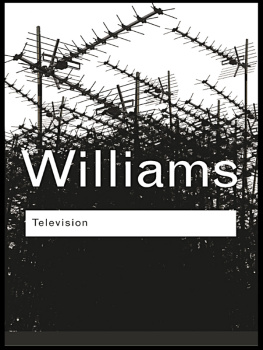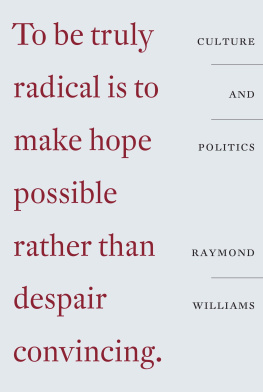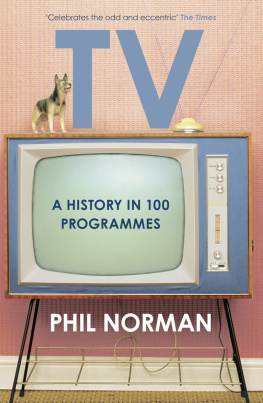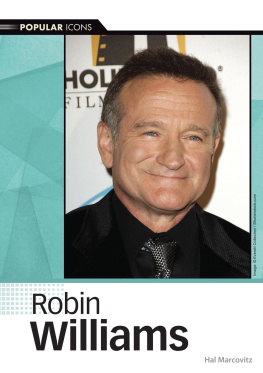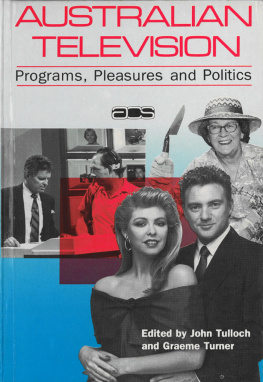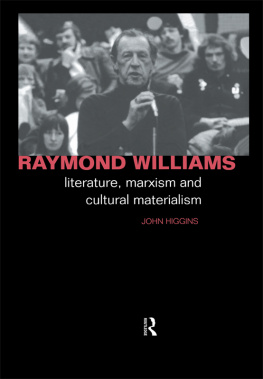This edition published in the Taylor & Francis e-Library, 2004.
All rights reserved. No part of this book may be reprinted or reproduced or utilised in any form or by any electronic, mechanical, or other means, now known or hereafter invented, including photocopying and recording, or in any information storage or retrieval system, without permission in writing from the publishers.
PREFACE TO THE ROUTLEDGE CLASSICS EDITION
The space between the first sentence of this book, It is often said that television has altered our world, and its last, in which Raymond Williams, with characteristic passion and intelligence, insists that the future of our media will depend on our capacity to make informed judgements and decisions about that future, is filled by a critical, insightful, iconoclastic and humane reading of televisions first half-century.
It is a reading which is informed, perhaps more than anything, by a night in Miami and a year at Stanford. It might appear that the latter was needed to enable him to understand the former, a night during which Williams, newly landed by boat from Europe, found himself entirely bemused by the flow of U.S. television, a flow in which one programme blended into another, in which advertisements were seamlessly threaded through the texts of soap operas, and in which trailers for one film provided a kind of invasive sub-text for the unfolding of another. At Stanford, in the Department of Communications, where this book was written, he worked through this confrontation, and in doing so he addressed the particular social and historical specificity of television, making it clear, powerfully and politically clear, how much its past, present and future, owed to human agency.
Television: Technology and cultural form is a book which has proved to be extraordinarily influential within the emergent fields of media and communication studies, but it has also become a classic statement of a range of arguments and critiques that still remain on the agenda whenever the present and future of the media are being discussed. What makes it so?
Perhaps above all because Williams rejects any form of technological determinism. He rejects those arguments which insist that technologies have a life of their own, that they emerge from a process of research and development untarnished by social expectations or political and economic interests. He rejects just as forcefully the arguments that technologies, by themselves, can determine a social response, that they have determining effects and consequences which are just as equally resistant to the complications and uncertainties of society and history. In other words he rejects the characterisation of television as technology, as such. It is not reducible.
Television emerged, as the telegraph, the telephone and radio had before it, as a technologically synthetic response to a set of newly emergent and radical social, political and economic needs.
Industrialisation and modernisation had created new demands and new challenges: for order, for control and for communication. Machines that had been both imagined and developed to provide singular responses to, mostly, military and industrial requirements (the management of both empires and railroads, and as often as not, both at once), would develop in unexpected ways in social and civilian guises. Williamss notion of mobile privatisation elegantly captures the particularity of the newly social, one might say suburban, world with which radio and television were to engage. This was a world of increasing individualisation and fragmentation; of the structurally displacing movements of populations from country to city, and from city to suburb; of the daily movements of workforces from private homes to public workplaces. Radio and television, mobilised within a dialectic of isolation and participation, created and enabled the as-if of mediated sociability within a framework of broadcast communication. Broadcasting was, then, in every sense, a social product. And what follows from this is a committing observation that the history (and even the sociology) of technology must be a history of its distribution, its institutionalisation and its uses.
That history in turn is one that is driven not by an abstract process of innovation, but by such human things as intention, interest, purpose and value. Williams has no time for abstraction. His materialism is both motor and brake, for while it is the case that technologies emerge and are shaped by the most powerful forces present in society, these forces, those of capital above all, are not omnipotent (though they are immensely potent) and can still be opposed by other, public interests, and mobilised by democratic states and articulate communities.
Television is therefore a distinct cultural product. Williams is in no doubt about its significance, even if he refuses singular accounts of it. But he is ambivalent, as Walter Benjamin before him was ambivalent when confronted with the cinema, about its value. Television operates at the interface between the elite and the popular, the commercial and the public, the state and the citizen; and each of its expressions, the various forms that he analyses in some detail, manifests the tensions, the ambiguities and the contradictions which subsequent critics, analysts and practitioners have continued to identify and yet still not resolve. Williams is hardly unusual in finding both things to praise and things to decry in contemporary television though his radical worldview never lets him his lose his guard.

